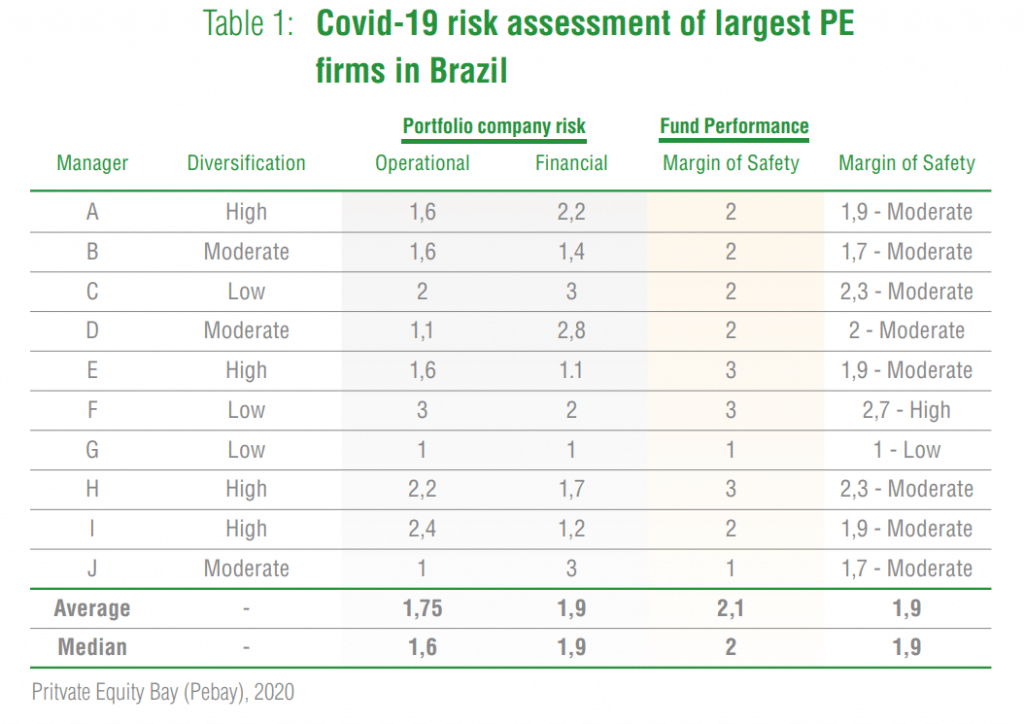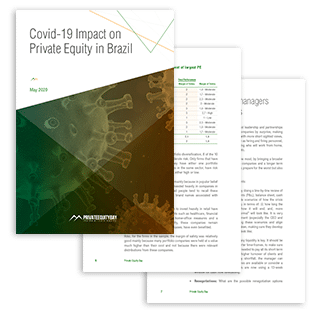Presentation
This time of the year Pebay usually publishes its Price & Performance
report. However these are not usual times. Brazil is still in quarantine
mode. Shops are closed in most States. Many are still working from
home, under contract suspension or work-time/wage reduction.
Disputes in the international oil market add further risk to an oil
producing country. Internal political disputes make daily headlines.
While the full impact of social distancing measures and of the deep
behaviour changes that will last for years to come are hard to predict,
it is possible to analyse how well prepared are the largest private equity
firms in Brazil to withstand this shock. We do it by looking at portfolio
companies, the sectors in which they operate, their level of debt and
cash. We also simulate a scenario of devaluation of the unrealized
deals to understand how fund performance could be impacted.
Results show that 8 of the 10 largest PE managers in Brazil have a
moderate risk level, except for two firms that have highly
concentrated portfolios. One invests in a single firm with low
Covid-19 risk. The other in a single sector very exposed to Covid-19
risk. We also discuss how private equity managers can help portfolio
companies survive the crisis and be ready to thrive afterwards. To
conclude we present a study case on how social-distancing is
actually having positive effects on digital companies.
I hope this text and study case can serve as an inspiration for
investors and entrepreneurs about how to prepare and stay tuned for
the opportunities that come with every crisis.
Impact on Portfolios and Firms
Private Equity Bay (Pebay) maintains a private equity intelligence
platform with information on close to 800 funds of 335 PE
managers. These funds have invested in almost 2,200 companies
and projects in Brazil. The database includes fund and deal cash flow,
as well as valuations. All in local currency. For this reason Pebay is
well positioned to evaluate the Covid-19 risk level for these entities.
We did this by looking at each portfolio company of the 10 largest
private equity groups in Brazil. Together these managers have R$
100 billion in NAV, representing 53% of the market. There are 155
different companies in their portfolios. We have checked the financial
health of their companies before the crisis and verified if the sectors
in which they operate are more or less exposed to Covid-19 impact.
The rationale is simple. Companies with more debt in sectors more
exposed to the crisis (tourism, physical retail etc.) will tend to suffer
more than companies with little debt in more protected sectors
(healthcare, non-discretionary consumption etc.).
Also, because Pebay has detailed cash flow and NAV information on
each fund, it was possible to simulate how a severe decrease in
valuations (we’ve modeled -50%) would impact the performance of
unrealized portfolios and, perhaps send a fund into negative territory
(multiple below 1). The stress test on fund performance is an
important indicator because low performance can jeopardize the
manager’s ability to raise more capital in the future, to capitalize
existing portfolio companies and to make new investments. It can
also wipe-out any performance fees accrued over time. In turn, these
factors can impact firm revenue, talent retention and so forth, posing
a threat to the firm’s own existence.
As discussed these risks were grouped in three pillars:
- Operational risks: How exposed are portfolio companies operations to Covid-19 risk in a scale of Low; Moderate or High. For example, companies in the retail sector with strong physical presence are at a high operational risk while healthcare companies that participate in the treatment of Covid-19 patients are at a low operational risk. It is a subjective analysis which also considered the adaptation capacity of the company to deliver products and services with shops closed and even negative news headlines from executives’ behaviour towards social distancing;
- Financial risk: How well is the financial situation of portfolio companies to withstand a period of low or negative cash generation, especially its debt and cash level. This was also measured in a scale of Low; Moderate or High. Companies with Net Debt/EBITDA higher than 3x and negative cash generation had a High risk. The same for companies with Net Debt/EBITDA higher than 6x. Companies with Net Debt/EBITDA lower than 3x and negative cash generation had Moderate risk. The same for companies with Net Debt/EBITDA higher than 3x and positive cash generation. Companies with Net Debt/EBITDA lower than 3x and positive cash generation had Low financial risk;
- Performance stress-test: How fund performance may be impacted by a devaluation of -50% across all portfolio companies. If fund multiple falls to less than 1x in local currency the fund has a low margin of safety. If multiple goes down but stays between 1 and 2 the margin of safety is moderate. If it stays above 2x the margin of safety is high. The multiple is calculated only for active funds and the formula used is straightforward: (distributed capital + pre-Covid-19 NAV *0,5) / (capital invested).
The variable “manager risk” is the simple average of the three
indicators.

Results below show that, due to portfolio diversification, 8 of the 10
largest PE firms in Brazil have a moderate risk. Only firms that have
a low diversification, meaning they have either one portfolio
company or a portfolio of companies in the same sector, have risk
levels in the extremities of the scale, either high or low.
This is a simple yet important result, mainly because in popular belief
private equity firms in Brazil have invested heavily in companies in
the retail / consumer sector. Indeed people tend to recall these
investments because of the strong brand names associated with
these types of companies.
However, even funds that are known to invest heavily in retail have
also sought to diversify into segments such as healthcare, financial
services, technology etc. Despite home-office measures and a
reduction in their level of activity, these companies remain
operational and in a few exceptional cases, have even benefited.
Also, for the firms in the sample, the margin of safety was relatively
good mainly because many portfolio companies were held at a value
much higher than their cost and not because there were relevant
distributions from these companies.
Impact for Investors
Brazilian private equity funds usually disclose their unaudited 1Q
NAV in the beginning of April. Due to Coronavirus, disclosure
deadlines have been pushed forward. Thus far only about 60% of
around 1,100 PE vehicles covered by Pebay have made public these
numbers which show no impact from Covid-19 yet. Only a small
0.57% reduction compared to 4Q2019 has been noticed.
While a handful of vehicles have already issued full 4Q2019 audited
reports, the general consensus between managers, administrators
and auditors of those vehicles is that, despite publication taking
place during quarantine, it is early to make any change on valuations.
Surely well-prepared PE managers have been actively
communicating with their LPs to convey the situation of each
invested company and measures taken. However the longer term
impacts of Covid-19, especially how the “new normal” will look like
one or two years from now, are still early to tell, leaving managers
with no ground to properly value their investments.
Meanwhile, both listed stocks, treasuries and bonds have been
marked down to market, creating a “denominator effect” in LPs
portfolios. It means that private equity allocation now seems bigger
than they actually are, sometimes taking a higher proportion than
investment policies and the regulation allow. It can also convey the
wrong impression that this asset class is less exposed to Covid-19
than others.
Brazilian pension funds are regulated by Superintendência Nacional
de Previdência Complementar (Previc). The entity is closely
monitoring the system’s payment capacity, awaiting for prices to
stabilize before taking any measure. The denominator effect should
not be an issue for pension fund managers. Firstly, these entities
have a much lower percentage of assets in private equity than their
US and European peers. Secondly, in case of a passive portfolio
misallocation Previc allows a period of 720 days to adjust
The role of PE managers during the crisis
It is during difficult moments that good leadership and partnerships
become visible. Covid-19 got many companies by surprise, making
executives operate in survival mode, with more short sighted views,
dealing with day-to-day problems such as hiring and firing personnel,
protecting clients and workers, defining who will work from home,
retaining clients, looking for liquidity etc.
This is when PE managers can help the most, by bringing a broader
view, experience from other portfolio companies and a longer term
perspective in order to help companies prepare for the worst but also
to thrive afterwards.
This can be done on several battle fronts:
- Financial: The PE team can start by doing a line-by-line review of each company’s financial statements (P&L), balance sheet, cash flow statement, simulating multiple scenarios of how the crisis will unfold. Each scenario can vary in terms of: (i) how long the crisis will last; (ii) when and how it will end; and, more importantly, (iii) how the “new normal” will look like. It is very important to involve top management (especially the CEO and CFO) in the process of validating these scenarios and align executives about measures to be taken, making sure they develop a vision about how the future will look like;
- Liquidity: During the crisis, company liquidity is key. It should be reassessed and forecasted on shorter time-frames, to make sure the company will have the liquidity needed to pay all its short term obligations, especially in light of higher turnover of clients and delinquency rates. If there is any shortfall, the manager can discuss with banks what credit lines are available or consider a capital increase. Some managers are now using a 13-week window for cash flow forecasting;
- Renegotiations: What are the possible renegotiation options available in terms of human resources, real estate rents, credit refinancing, clients etc.? Which renegotiations make sense and which go against the firm’s value, or may end-up harming relationships and reputation?;
- Sharing of experiences and best practices: PE firms usually have investments in several companies and a rich network with businesses in general, putting them in a favorable position to facilitate the sharing of knowledge among executives. For example, by connecting heads of human resources of different companies there can be a valuable discussion about new changes in work laws, available government aids, how the workspace will look like, which measures of social-distancing and working-from-home will last beyond the crisis etc. The same can be done with CFOs, CIOs and CEOs, allowing them to discuss and develop a shared view about the future. PE firms with global portfolios and networks have a further advantage as companies in countries that are in the late stages of Covid-19 contagion (or out of quarantine already) certainly have tested practices to share;
- M&A: With prices of assets lower, companies that have been able to secure the right amount of liquidity may start looking for M&A opportunities. Targets that were not available before the pandemic may now be at reach. Be it to consolidate fragmented markets, to enter new areas or to enhance technology capabilities. As risks are higher for PE funds to make investments in new firms now, the possibility of funding M&A activities of companies already in the portfolio seems a sensible way to deploy committed capital.
| Box 1: The time has come for Digital companies: the case of Petlove Coronavirus pandemic has hit companies hard, especially those that had to close their physical stores. On the same token, it has created opportunities for players in the digital marketplace, mainly distributors of non-discretionary products, anticipating several trends that venture capital (VC) and private equity (PE) investors foresaw when making a bet in those business models. Petlove is a good example of that. It is the leading e-commerce of pet products and services in Brazil. Focusing solely on online channel it made R$300 million in revenues in 2019, competing with companies such as Petz (R$986 million in revenues in 2019), the biggest chain of physical stores and market leader Cobasi which was the first to go beyond R$1 billion revenues, a mark achieved in 2018. Petlove was growing fast, 51% CAGR between 2015 and 2019 while its main physical competitor Petz grew 32.4% p.y. in the same period, mainly driven by the opening of new stores. But Covid-19 self-isolation measures changed the game. It not only forced consumers to go digital in order to buy goods without leaving home, but also created a much closer relationship between humans and pets. As a result Petlove’s growth accelerated to ~60% p.y based on March 2020 results, bringing the company to around R$40 million of monthly revenues. According to Euromonitor, Brazil has the third largest population of pets, 88 million strong (dogs and cats only). It is the fourth largest market in terms of value, with R$23.5 billion in revenues. While specialized retailers are favored by clients vis-a-vis supermarket chains, e-commerce still has a mere 4% penetration. This compares with 21% in the US and 43% in China. Retail has been undergoing a global shift toward digitalization. News of once undisputed leaders such as Toys R Us filing for bankruptcy in the last couple years has raised the alarm. The pet segment is no different. In June 2019 US company Petsmart decided to spin-off and make a public offering of its e-commerce arm Chewy. It was a move to allow the parent company to cope with its heavy debt payments. During the pandemic Chewy, which has a business model similar to Petlove’s, has seen its stock price double. Until recently Petlove operated as a first-party relationship (1P) e-commerce, meaning it was a retailer, keeping its own stocks and dealing with online clients directly. With that business model in mind, in 2012 Petlove received a round of VC investment from Tiger Global, Kaszek and Monashees, a local VC that usually brings US VC funds as co-investors. More recently, Tiger began looking for an exit opportunity, allowing Tarpon Investimentos to acquire its stake in the company. Tarpon started in 2002 totally focused on public equities. In 2006 it launched a private equity practice through a hybrid fund. Its inaugural PE investment in shoe retailer Arezzo was a home run, returning 15x invested capital after a successful IPO. During the hot IPO market of 2007, in a pioneering move, Tarpon went public in Bermuda to raise perennial capital, thus becoming a listed company. In 2012 it decided to make highly concentrated bets in big companies, becoming de-facto business operators, a risky move that turned sour after losses and negative headlines accumulated in BRF Foods. Once again Tarpon reinvented itself. In the last three years it delisted from the stock market, unwinded its hybrid fund, focused its attention to public equities and is now doing a few club deals with proprietary capital and co-investment from local entrepreneurial families. The target are small and mid-sized companies with digital business models. Tarpon ended-up acquiring a 61% stake in Petlove. While some of the investment was to buy Tiger’s stake, it also did two rounds of primary investment. One to foster founder & CEO Márcio Waldman’s subscription service for pet food, transforming the sale of a “commodity” such as pet food into a recurring event, reducing customer conversion cost, lowering stock levels and optimizing logistics. It also increases the comfort to consumers and allows the company to develop a better relationship with each client. For example, providing content specific to each pet race and age. The other round allowed Petlove to buy Vet Smart, a leading app that counts 100.000 veterinarians, a move to expand Petlove’s ecosystem. Petlove has also launched a marketplace for local pet shops and veterinarians to sell their own products and services, transforming it from a 1P to a third-party (3P) marketplace. Petlove’s moves have not gone unnoticed. On April 7th, in the middle of the pandemic it was announced that Softbank, which runs the largest VC fund globally and one of the largest funds for Latin America is making a R$250 million bet in the company and its plans to enhance omnichannel capabilities. The investment comes in a very momentous time for the company, as digital marketing costs have plummeted and M&A targets tend to be cheaper now. The pandemic has also attracted attention of its rivals, which will surely anticipate their digitalization strategies. Before the pandemic Petz already planned to use 15% of capital raised through its IPO for technology and digital. |
About Private Equity Bay (Pebay)
Private Equity Bay (Pebay) maintains an online private equity
intelligence service (Pebay.info) specialized in PE, Real Estate,
Infrastructure and similar investments in Brazil. Pebay tracks and
analyses performance of more than 1.040 funds, of 415
managers, as well as more than 2.900 invested companies and
projects with data on investments, financials and valuations. All
based on the highest standards of quality and reliability. With Pebay
investors can better monitor their investments, compare
performance, originate opportunities, access the secondary market
and reduce time spent with search and treatme


